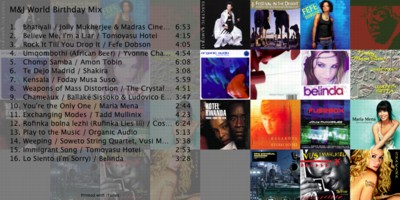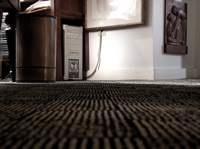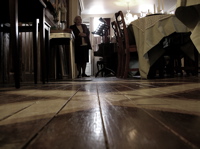14 April 2005 to 31 March 2005
¶ iTunes customization · 14 April 2005 fiction/tech
Before Tiger renders some large amount of it obsolete, I want to make some notes about my customized iTunes configuration. The actual Applescript code is too obscure and specific to be very enlightening, but possibly a brief description of the overall flow would be of interest to others.
First some notes about use. At this point iTunes controls virtually all of my music listening. The bulk of my music is still acquired by purchasing physical CDs, but these are ripped into iTunes immediately (AAC, 128kbps). At home our main stereo is hooked to an Airport Express so both B and I can beam music to it from our Powerbooks. We both also have small speakers on our desks, and there's another set by the bed that we can plug iPods into when we want. I still do use the CD changer in my car, but both of us also use our iPods in our cars, and I use either the Powerbook or the iPod at work.
My music collection is far larger than my Powerbook or iPod can accommodate, so my encoded selection rotates as new and revived interests push other things out of the active 20GB. Much of the time I use iTunes in Browse mode, listening to individual whole albums in the same way I would have pre-shuffle-era. But increasingly, and especially during periods when my listening isn't so dominated by new releases, I also use iTunes' Party Shuffle mode, fed by a Smart Playlist that filters out non-music genres, cuts out tracks that are too short (<1:30) or too long (>5:22) for my shuffle attention-span, and via another playlist reference excludes anything that has been played recently (i.e., in the last two weeks, or the last 10 hours of music, whichever list is shorter). If I'm in an especially random mood, I have an Applescript that goes through the upcoming Party Shuffle selections and eliminates repetition of artists.
Organizationally, I normalize all incoming music to one of four genre tags: J-Pop, Metal, Noise and Rock, where "Rock" means simply "everything else". For sorting purposes I flip all artist names to "Last, First" and delete leading "The"s. Sound Check, Sound Enhancer and Crossfade Playback are all off. I show the little arrow links, but have tweaked the preference file so that they search within my library first, instead of jumping to the iTMS.
I use Synergy heavily. The Play/Pause button sits alone in my menu bar, but I have keyboard shortcuts for Previous, Play/Pause, Next, Volume Up and Volume Down, and I like Synergy's own Floater better than the version it produces through Growl. The rest of my customization is run by an Applescript triggered by Synergy as a Track Change Item.
The script in turn does several things:
1. Updates my IM status message to include the track info for whatever is playing.
2. Uploads the track info and artwork for the current track to this website, with the proper HTML encoding for Unicode characters.
3. Maintains a single-track playlist called "last started" which contains the most recent track that iTunes began playing.
4. Checks, any time iTunes switches to the "stopped" state, to see if the track in "last started" is the same as the last track in "Recently Played" (which iTunes adds tracks to when they finish), and if so, if that track falls in the middle of an album. If all these things are true, the script restarts playback on the next track of that album. This is a complicated but fairly effective way of compensating for iTunes' predilection to lose track of what it was playing if you're poking around in your Library or the iTMS while you're listening to something else. The began/finished double-check is necessary to prevent this part of the script from effectively disabling the Stop button entirely, which my first iteration of it did.
5. Automatically updates the rating for the track. Although on very rare occassions I do rate tracks manually, for the most part I find that it is more effective to treat the rating as a temporary variable representing my actual behavior towards the track, instead of an attempt to measure my subjective assessment directly. In my case, the rules are approximately these (I've left out some of the more logistical obscurities):
a. New songs enter the system rated 0, which means simply "unplayed".
b. If a song plays all the way through, and it is currently rated 0 or 1, its rating is increased to 2.
c. If a song is played again while it is still on the Recently Played playlist (which with my Party Shuffle configuration would only happen through my deliberate action), its rating is increased. It takes only one repetition to promote a track from 2 to 3, but two to go from 3 to 4, and three to go from 4 to 5. So 5, my highest rating, means that I've played the song all the way through at least seven times in relatively close succession.
d. If a song plays for at least :03, but less than half its length, its rating is decreased by 1. It takes only one skip to demote a track from 5 to 4, 4 to 3 or 3 to 2, but two to go from 2 to 1. Since promotion goes from 0 directly to 2, the rating 1 is reached only by demotion, which allows it to serve as an unambiguous indicator of disfavor.
e. If a set of songs from an album plays all the way through in order, and then the subsequent track on the album starts but doesn't finish, and nothing else from that album is played, I am considered to have skipped all the unplayed songs on the album (where "unplayed" means they don't occur in the previous or next 10 entries in the track history, to catch the case where I interrupt an album but return to it). This rule is screwed up if I single out the last song on the album, since there's no subsequent track to check for, so I try not to do that.
f. At the end of a calendar month, any song with a rating of 3 or lower that hasn't been played since the previous calendar month has its rating decreased by 1, and any track whose rating would be reduced to 0 by this is left at 1 but added to a "to be deleted" playlist, which at the moment I still review manually. The missing detail here, obviously, is that I need to keep track of both a track's current rating and its historical maximum. A track that never got above 3 can be deleted when it gets back to 0, but a track that was ever rated 4 or higher should be down-converted to a lower bitrate encoding instead of being deleted entirely. Hopefully the new Automator framework in Tiger will expose programmatic control of encoder parameters, which the Applescript interface to iTunes 4.7.1 does not.
6. Feeds the track's first two artworks (on the assumption that these are the front and back cover) via ImageEngine to Manatics' Handler plug-in, set at 15%, which applies a mostly transparent mask of my scanned-fingerprints to simulate package wear. The script skips this step if the track or its album are repeated without any non-album tracks intervening, figuring that in physical use this would have meant I didn't need to touch the LP sleeve or CD case.
7. Checks the Comment section for the track, which I maintain in a semi-structured format, for my private rights coding. Any track marked "Bought" came from a legally purchased CD or download, and so requires no further compensation to be issued. A track marked "Preview" is one I have acquired without the artist being compensated, but which only exists temporarily in my library while I decide whether to purchase it. By default no compensation is issued for these tracks during the first week after they are added to the library. Each time one is played more than a week after download, the script asks whether to convert their status to "Honor". Tracks marked "Honor" are ones for which I owe the artist separate compensation from any involved in acquiring the data itself.
For handling the bookkeeping of this separate compensation, the script (actually a combination of Applescript and perl/MySQL) maintains an external database of compensatable artists. By default each full album is worth $4, and individual non-album tracks are worth $0.20 (the system provides support for different values per-album and per-track, and for different system defaults based on acquisition date, but at the moment I'm not actually using those features). I prorate these amounts over the first four times I play the material, so if I play a whole album once, but only once, my accounting considers the artist to be owed only 1/4 of the value, currently $1. The database keeps track of the total amount I owe each artist, the amount they have been paid already, and the amount that has been transferred into a compensation escrow account.
For artists who accept electronic payment via Paypal or credit cards, the database records the relevant payment info. A separate nightly perl script issues electronic payments (via CapitolOne's excellent web-services "micropayment" (sic) interface) where possible (batched until the amount exceeds $1.75), and for artists without electronic payment info, totals the corresponding amounts and transfers the overall total to the money-market escrow account I have for this purpose. The escrow account isn't automated yet, but I usually kludge around this, when I get new payment info for an artist, by simply moving the money back out of escrow, resetting the amount paid/escrowed to $0, and rerunning the original script. At the end of each month I mail physical checks to artists for whom I have physical addresses but not electronic, and rebalance the escrow account accordingly. I don't currently have a way to split this compensation across the performer and the publisher for material where the two are different. The best I can do is include track info with all my payments and rely on the artist in turn to pay for material they acquired from elsewhere.
8. Finally, and I admit that this last bit is a little geeky, the script files some extra metadata that I use periodically to generate some reports of personal interest. It notes a) where I was when I played a track, b) if it's a running day, whether the track was played before or after my run, c) whether the previous track's info got any hits on my website before being replaced by the current one, d) whether the track starts or ends exactly on a minute boundary according to the NIST atomic clock, e) how many years old the track is (that is, current year minus release year), f) whether the track is an alternate version of an original album track, and g) if the track comes from a release that consisted on CD of multiple discs. For portability reasons this metadata is written into a semicolon-delimited self-addressed email, and re-extracted by a different Applescript run by a Mail rule and appended to an Excel file that I then output in PDF form for archiving.
Clearly there's a lot more that could be done to make my iTunes usage actually conform to my personal listening habits, rather than me just letting the technology control my life the way it usually does, but eventually you've got to strike some kind of balance.
First some notes about use. At this point iTunes controls virtually all of my music listening. The bulk of my music is still acquired by purchasing physical CDs, but these are ripped into iTunes immediately (AAC, 128kbps). At home our main stereo is hooked to an Airport Express so both B and I can beam music to it from our Powerbooks. We both also have small speakers on our desks, and there's another set by the bed that we can plug iPods into when we want. I still do use the CD changer in my car, but both of us also use our iPods in our cars, and I use either the Powerbook or the iPod at work.
My music collection is far larger than my Powerbook or iPod can accommodate, so my encoded selection rotates as new and revived interests push other things out of the active 20GB. Much of the time I use iTunes in Browse mode, listening to individual whole albums in the same way I would have pre-shuffle-era. But increasingly, and especially during periods when my listening isn't so dominated by new releases, I also use iTunes' Party Shuffle mode, fed by a Smart Playlist that filters out non-music genres, cuts out tracks that are too short (<1:30) or too long (>5:22) for my shuffle attention-span, and via another playlist reference excludes anything that has been played recently (i.e., in the last two weeks, or the last 10 hours of music, whichever list is shorter). If I'm in an especially random mood, I have an Applescript that goes through the upcoming Party Shuffle selections and eliminates repetition of artists.
Organizationally, I normalize all incoming music to one of four genre tags: J-Pop, Metal, Noise and Rock, where "Rock" means simply "everything else". For sorting purposes I flip all artist names to "Last, First" and delete leading "The"s. Sound Check, Sound Enhancer and Crossfade Playback are all off. I show the little arrow links, but have tweaked the preference file so that they search within my library first, instead of jumping to the iTMS.
I use Synergy heavily. The Play/Pause button sits alone in my menu bar, but I have keyboard shortcuts for Previous, Play/Pause, Next, Volume Up and Volume Down, and I like Synergy's own Floater better than the version it produces through Growl. The rest of my customization is run by an Applescript triggered by Synergy as a Track Change Item.
The script in turn does several things:
1. Updates my IM status message to include the track info for whatever is playing.
2. Uploads the track info and artwork for the current track to this website, with the proper HTML encoding for Unicode characters.
3. Maintains a single-track playlist called "last started" which contains the most recent track that iTunes began playing.
4. Checks, any time iTunes switches to the "stopped" state, to see if the track in "last started" is the same as the last track in "Recently Played" (which iTunes adds tracks to when they finish), and if so, if that track falls in the middle of an album. If all these things are true, the script restarts playback on the next track of that album. This is a complicated but fairly effective way of compensating for iTunes' predilection to lose track of what it was playing if you're poking around in your Library or the iTMS while you're listening to something else. The began/finished double-check is necessary to prevent this part of the script from effectively disabling the Stop button entirely, which my first iteration of it did.
5. Automatically updates the rating for the track. Although on very rare occassions I do rate tracks manually, for the most part I find that it is more effective to treat the rating as a temporary variable representing my actual behavior towards the track, instead of an attempt to measure my subjective assessment directly. In my case, the rules are approximately these (I've left out some of the more logistical obscurities):
a. New songs enter the system rated 0, which means simply "unplayed".
b. If a song plays all the way through, and it is currently rated 0 or 1, its rating is increased to 2.
c. If a song is played again while it is still on the Recently Played playlist (which with my Party Shuffle configuration would only happen through my deliberate action), its rating is increased. It takes only one repetition to promote a track from 2 to 3, but two to go from 3 to 4, and three to go from 4 to 5. So 5, my highest rating, means that I've played the song all the way through at least seven times in relatively close succession.
d. If a song plays for at least :03, but less than half its length, its rating is decreased by 1. It takes only one skip to demote a track from 5 to 4, 4 to 3 or 3 to 2, but two to go from 2 to 1. Since promotion goes from 0 directly to 2, the rating 1 is reached only by demotion, which allows it to serve as an unambiguous indicator of disfavor.
e. If a set of songs from an album plays all the way through in order, and then the subsequent track on the album starts but doesn't finish, and nothing else from that album is played, I am considered to have skipped all the unplayed songs on the album (where "unplayed" means they don't occur in the previous or next 10 entries in the track history, to catch the case where I interrupt an album but return to it). This rule is screwed up if I single out the last song on the album, since there's no subsequent track to check for, so I try not to do that.
f. At the end of a calendar month, any song with a rating of 3 or lower that hasn't been played since the previous calendar month has its rating decreased by 1, and any track whose rating would be reduced to 0 by this is left at 1 but added to a "to be deleted" playlist, which at the moment I still review manually. The missing detail here, obviously, is that I need to keep track of both a track's current rating and its historical maximum. A track that never got above 3 can be deleted when it gets back to 0, but a track that was ever rated 4 or higher should be down-converted to a lower bitrate encoding instead of being deleted entirely. Hopefully the new Automator framework in Tiger will expose programmatic control of encoder parameters, which the Applescript interface to iTunes 4.7.1 does not.
6. Feeds the track's first two artworks (on the assumption that these are the front and back cover) via ImageEngine to Manatics' Handler plug-in, set at 15%, which applies a mostly transparent mask of my scanned-fingerprints to simulate package wear. The script skips this step if the track or its album are repeated without any non-album tracks intervening, figuring that in physical use this would have meant I didn't need to touch the LP sleeve or CD case.
7. Checks the Comment section for the track, which I maintain in a semi-structured format, for my private rights coding. Any track marked "Bought" came from a legally purchased CD or download, and so requires no further compensation to be issued. A track marked "Preview" is one I have acquired without the artist being compensated, but which only exists temporarily in my library while I decide whether to purchase it. By default no compensation is issued for these tracks during the first week after they are added to the library. Each time one is played more than a week after download, the script asks whether to convert their status to "Honor". Tracks marked "Honor" are ones for which I owe the artist separate compensation from any involved in acquiring the data itself.
For handling the bookkeeping of this separate compensation, the script (actually a combination of Applescript and perl/MySQL) maintains an external database of compensatable artists. By default each full album is worth $4, and individual non-album tracks are worth $0.20 (the system provides support for different values per-album and per-track, and for different system defaults based on acquisition date, but at the moment I'm not actually using those features). I prorate these amounts over the first four times I play the material, so if I play a whole album once, but only once, my accounting considers the artist to be owed only 1/4 of the value, currently $1. The database keeps track of the total amount I owe each artist, the amount they have been paid already, and the amount that has been transferred into a compensation escrow account.
For artists who accept electronic payment via Paypal or credit cards, the database records the relevant payment info. A separate nightly perl script issues electronic payments (via CapitolOne's excellent web-services "micropayment" (sic) interface) where possible (batched until the amount exceeds $1.75), and for artists without electronic payment info, totals the corresponding amounts and transfers the overall total to the money-market escrow account I have for this purpose. The escrow account isn't automated yet, but I usually kludge around this, when I get new payment info for an artist, by simply moving the money back out of escrow, resetting the amount paid/escrowed to $0, and rerunning the original script. At the end of each month I mail physical checks to artists for whom I have physical addresses but not electronic, and rebalance the escrow account accordingly. I don't currently have a way to split this compensation across the performer and the publisher for material where the two are different. The best I can do is include track info with all my payments and rely on the artist in turn to pay for material they acquired from elsewhere.
8. Finally, and I admit that this last bit is a little geeky, the script files some extra metadata that I use periodically to generate some reports of personal interest. It notes a) where I was when I played a track, b) if it's a running day, whether the track was played before or after my run, c) whether the previous track's info got any hits on my website before being replaced by the current one, d) whether the track starts or ends exactly on a minute boundary according to the NIST atomic clock, e) how many years old the track is (that is, current year minus release year), f) whether the track is an alternate version of an original album track, and g) if the track comes from a release that consisted on CD of multiple discs. For portability reasons this metadata is written into a semicolon-delimited self-addressed email, and re-extracted by a different Applescript run by a Mail rule and appended to an Excel file that I then output in PDF form for archiving.
Clearly there's a lot more that could be done to make my iTunes usage actually conform to my personal listening habits, rather than me just letting the technology control my life the way it usually does, but eventually you've got to strike some kind of balance.
¶ new audiotest · 12 April 2005
20 short clips of unidentified cover songs you might enjoy recognizing or not.
¶ 12 April 2005
There are two songs I never finished that periodically come back to mind. One was an awkward story about ecocatastrophe, extraterrestrial emigration and constructed aesthetics called "The Death Rose", which I was working on interminably in Cakewalk at the point a decade ago when I decided that my MIDI array was keeping me from ever finishing songs. Switching to analog instruments for a while did, in fact, radically improve my productivity, but it also orphaned that song, which sounded wrong to me whenever I tried to reinvent it outside of its programmed loops. Every once in a while, though, I still find myself arbitrarily humming "...merging our hyyyyyydrofarms into a terraformed commmmmmmpromiii-zeh-...", which probably in itself tells you enough to guess that nobody is really missing much. But we'll never know for sure. Only the me that still took the song seriously could have finished it.
The other song was even more stilted, a weird poetic-justice revenge fantasy crossed with an insurance procedural, told as the suicide monologue of a protest-casualty activist's widow driving an explosives-laden Toyota Celica into Manhattan from New Jersey. I wrote the lyrics to this one in 1986 or 1987, and obviously it would come off very differently now. Writing-wise, its biggest problem was that I used more specific place-detail than I was actually familiar with, and never took the time to go find out whether that particular block of the Avenue of the Americas, or that particular inbound Holland Tunnel lane, had any of the properties the events of the song required. Also, it's not clear what I had against Celicas. Possibly these problems could be fixed.
But I've never been able to think of another name for the character in the song. The widow never identifies herself, but she repeats her husband's name several times, quoting news stories and police reports and insurance forms. The name I invented, at random, entirely for the way the consonants and vowels of it fit the melody, was Randall Thierry. I am nearly certain that I had never heard the name of Operation Rescue founder Randall Terry before that, but I certainly have since, and Terry is not at all the kind of activist I meant. It seems like it should be incredibly trivial to switch out "Randall Thierry" for a name with a similar shape, like "Matthew Delaney" or "Carlo Fiori" or something, but I've never thought of one that doesn't sound wrong to me when I sing it. In my head, the character's name is Randall Thierry, and that means the small story of his accidental fictional martyrdom and has been pre-empted by a real man's sadly non-fictional idiocies.
So next time you feel like self-censoring some pretentious, awkward, overwrought, underinformed thing you half-invented, just remember that you grow too quickly out of every precious delusion, and whatever the realities that supplant them offer us, it's almost never deeper comfort or higher inspiration. We should write down, every day, everything we can imagine we believe. Otherwise, how many of them will by tomorrow we already have lost?
The other song was even more stilted, a weird poetic-justice revenge fantasy crossed with an insurance procedural, told as the suicide monologue of a protest-casualty activist's widow driving an explosives-laden Toyota Celica into Manhattan from New Jersey. I wrote the lyrics to this one in 1986 or 1987, and obviously it would come off very differently now. Writing-wise, its biggest problem was that I used more specific place-detail than I was actually familiar with, and never took the time to go find out whether that particular block of the Avenue of the Americas, or that particular inbound Holland Tunnel lane, had any of the properties the events of the song required. Also, it's not clear what I had against Celicas. Possibly these problems could be fixed.
But I've never been able to think of another name for the character in the song. The widow never identifies herself, but she repeats her husband's name several times, quoting news stories and police reports and insurance forms. The name I invented, at random, entirely for the way the consonants and vowels of it fit the melody, was Randall Thierry. I am nearly certain that I had never heard the name of Operation Rescue founder Randall Terry before that, but I certainly have since, and Terry is not at all the kind of activist I meant. It seems like it should be incredibly trivial to switch out "Randall Thierry" for a name with a similar shape, like "Matthew Delaney" or "Carlo Fiori" or something, but I've never thought of one that doesn't sound wrong to me when I sing it. In my head, the character's name is Randall Thierry, and that means the small story of his accidental fictional martyrdom and has been pre-empted by a real man's sadly non-fictional idiocies.
So next time you feel like self-censoring some pretentious, awkward, overwrought, underinformed thing you half-invented, just remember that you grow too quickly out of every precious delusion, and whatever the realities that supplant them offer us, it's almost never deeper comfort or higher inspiration. We should write down, every day, everything we can imagine we believe. Otherwise, how many of them will by tomorrow we already have lost?
¶ Coda for 610.1 · 12 April 2005 fiction/poem
We looked for you in this nearest water
until there was nothing in our hands but your salt
and though we tell parables of your fears
that we only ever believe as a kinder doubt than truth
we miss you in this city you left behind
in precious figures and previous shores.
until there was nothing in our hands but your salt
and though we tell parables of your fears
that we only ever believe as a kinder doubt than truth
we miss you in this city you left behind
in precious figures and previous shores.
¶ M&J World Birthday iMix · 6 April 2005

The only way I ever get to make an unabridged iMix is when its organizing rationale involves buying the tracks from the iTMS in the first place. So here.
Thanks, M&J!
¶ 4 April 2005
I want to be faster.
Yesterday I ran in my first real road race, where the measures of reality are formal registration, a race number, and officially tabulated results. I did the 5 miles in a recorded time of 34:44, which was a 6:57/mile pace, good enough for 48th out of 416 finishers and 666 entrants, and 14th out of 51 men ages 30-39.
5 miles is what I usually run, four or five days a week, and I almost never go farther. 7:00/mile is how fast I try to run it any time there aren't any mitigating factors. 6:57/mile is a good pace, but my personal record over that distance is 6:51/mile, twice, not even under race conditions. I'd be disappointed in myself for not pushing harder to beat that in this race, but those PRs were set back in the fall, and over the winter the ground conditions and a flu and a couple injuries have kept me at much slower speeds, so I opted to just take this one easy and see how it went. Race conditions are different, psychologically, and I don't have enough racing (or even running) experience to be able to factor them out and tell how near I am to my physical capacity. So I ran not to beat myself, but to be sure I wouldn't crash.
And now I want to do better. Never mind the high-school track-team that finally passed me in the last mile, I turn 38 today and thus will be in the 40-49 division by the time I have enough running experience for serious goals. As a 40-year-old in this race, 34:44 would have got me 12th. 6:00/mile would have won. In all, 15 men (and one woman) older than I am ran faster than I did, including two guys in their 50s. I'm 38 and haven't even been running for a year yet, so surely this is not my limit. I am only just beginning.
I am 38 today, and just beginning many things, and looking forward to all the beginning I still haven't done.
Yesterday I ran in my first real road race, where the measures of reality are formal registration, a race number, and officially tabulated results. I did the 5 miles in a recorded time of 34:44, which was a 6:57/mile pace, good enough for 48th out of 416 finishers and 666 entrants, and 14th out of 51 men ages 30-39.
5 miles is what I usually run, four or five days a week, and I almost never go farther. 7:00/mile is how fast I try to run it any time there aren't any mitigating factors. 6:57/mile is a good pace, but my personal record over that distance is 6:51/mile, twice, not even under race conditions. I'd be disappointed in myself for not pushing harder to beat that in this race, but those PRs were set back in the fall, and over the winter the ground conditions and a flu and a couple injuries have kept me at much slower speeds, so I opted to just take this one easy and see how it went. Race conditions are different, psychologically, and I don't have enough racing (or even running) experience to be able to factor them out and tell how near I am to my physical capacity. So I ran not to beat myself, but to be sure I wouldn't crash.
And now I want to do better. Never mind the high-school track-team that finally passed me in the last mile, I turn 38 today and thus will be in the 40-49 division by the time I have enough running experience for serious goals. As a 40-year-old in this race, 34:44 would have got me 12th. 6:00/mile would have won. In all, 15 men (and one woman) older than I am ran faster than I did, including two guys in their 50s. I'm 38 and haven't even been running for a year yet, so surely this is not my limit. I am only just beginning.
I am 38 today, and just beginning many things, and looking forward to all the beginning I still haven't done.
I trust this finds you all well, and I'm flattered and humbled that so many of you were so quick to not respond when I asked if anybody wanted to not know how the trip went. I like to think that in essence we are ambassadors and scientists at once, and you are our patrons in everything but the monetary and emotional and canonical senses.
I hope none of you will be offended by this format, but as you well know if you've traveled abroad in the past few years, the cost of importing envelopes has become simply prohibitive. I set my camera to its highest optimization before we left, so hopefully even with so many pictures the page will only be a little bit slow to load, and I truly believe you'll agree that it's worth a few minutes of modem squawk to get a direct secondhand glimpse of what most of us have only ever read about seeing in book reviews excerpted on radio programmes.

This, obviously, is what we have traveled so far to see, and we are dumbfounded by our great luck in spotting such an archetypal example on our very first day of searching, almost within the first hour. Clearly this is not as large as they come (for scale, the penguin visible in the upper left is about four inches tall, and 250 yards upwind), but the thrill of encountering one in person, in the wild, is obviously qualitative, not quantitative. We wished all of you could have been there, although there would only have been room for one more on the way out, and two on the way back.

We tracked it for almost an eighth of an hour, but eventually we were driven back into the helicopter by the mosquitos and locusts and bears. Locusts smell terrible. They don't tell you that in the guide books. I guess if they did, nobody would come. Anyway, here Enrico and Ivanzo are comparing scalp wounds. They all look appalling at this altitude, of course, but in the end the only one that even required prayer is the sort of Datsun-shaped one on Enrico's left arm. His left arm, I mean, which you can just see below us on the ground as we hover trying to hear what he's yelling up to us. It's hard enough to understand their language without the bears.

The ecological situation in the entire basin is dire almost beyond ellipsis. When Perry and Walters were here just two weeks ago, we would not have been able to see the delta at all from this angle. Today it lies almost half a mile below sea level. It's hard to stay silent, much less unscented. Confronted with this much depreciation it's almost impossible to believe that geotaxic problems are really caused by anthropedogogical errors of scale. This is a failure of culture, not of infraculture, and you can't just come here and presume to fix what is broken. We tried that in the Vanjj and the Oyulta and Costa Azulpelo, and this time we've promised not to repeat our mistakes twice. So we still write the letters, as our conscience demands, but we mail them only to ourselves, at a rural post office so small that three of them fit into a building that used to be mosque, and then a Fotomat, and then the National Museum of Ministries.

How fittingly ironic, then, that the defining moment of the trip would hardly be about zoography at all. After all the miles, and all the hours with tweezers and echinacea, it's not until we are back on the mainland sitting comfortably in a local theme-pub, surrounded by gleaming lucite and lavender thrushes, that the true significance of what we've seen begins to rise back up my throat. Like only an elite few before us, we have gone on a journey to the edge of despair and we have brought it back with us alive. Surely any of you would have done the same in our place, and yet just as surely, sometimes when it's amazing a thing is done at all, you have to do it yourself.

All too soon, though, it is time to go. We've made lifelong friends, some of them our lives and some of them theirs, and one or the other of us will never forget. This enchanted country has touched us, somewhere deep inside, possibly our RNA, although we won't know for certain until we can get home and have the tests done. But as so many members of the government take a moment from checking their parachutes to smile at us and wish us well just before the plane reaches international airspace, I feel like we have accomplished something after all. Our therapists didn't believe us then, and they probably won't take us on again now, but I think we've had the last word. I write it on a scrap of inflight magazine, and let the thin, sighing wind carry it out the door and away.
I hope none of you will be offended by this format, but as you well know if you've traveled abroad in the past few years, the cost of importing envelopes has become simply prohibitive. I set my camera to its highest optimization before we left, so hopefully even with so many pictures the page will only be a little bit slow to load, and I truly believe you'll agree that it's worth a few minutes of modem squawk to get a direct secondhand glimpse of what most of us have only ever read about seeing in book reviews excerpted on radio programmes.

This, obviously, is what we have traveled so far to see, and we are dumbfounded by our great luck in spotting such an archetypal example on our very first day of searching, almost within the first hour. Clearly this is not as large as they come (for scale, the penguin visible in the upper left is about four inches tall, and 250 yards upwind), but the thrill of encountering one in person, in the wild, is obviously qualitative, not quantitative. We wished all of you could have been there, although there would only have been room for one more on the way out, and two on the way back.

We tracked it for almost an eighth of an hour, but eventually we were driven back into the helicopter by the mosquitos and locusts and bears. Locusts smell terrible. They don't tell you that in the guide books. I guess if they did, nobody would come. Anyway, here Enrico and Ivanzo are comparing scalp wounds. They all look appalling at this altitude, of course, but in the end the only one that even required prayer is the sort of Datsun-shaped one on Enrico's left arm. His left arm, I mean, which you can just see below us on the ground as we hover trying to hear what he's yelling up to us. It's hard enough to understand their language without the bears.

The ecological situation in the entire basin is dire almost beyond ellipsis. When Perry and Walters were here just two weeks ago, we would not have been able to see the delta at all from this angle. Today it lies almost half a mile below sea level. It's hard to stay silent, much less unscented. Confronted with this much depreciation it's almost impossible to believe that geotaxic problems are really caused by anthropedogogical errors of scale. This is a failure of culture, not of infraculture, and you can't just come here and presume to fix what is broken. We tried that in the Vanjj and the Oyulta and Costa Azulpelo, and this time we've promised not to repeat our mistakes twice. So we still write the letters, as our conscience demands, but we mail them only to ourselves, at a rural post office so small that three of them fit into a building that used to be mosque, and then a Fotomat, and then the National Museum of Ministries.

How fittingly ironic, then, that the defining moment of the trip would hardly be about zoography at all. After all the miles, and all the hours with tweezers and echinacea, it's not until we are back on the mainland sitting comfortably in a local theme-pub, surrounded by gleaming lucite and lavender thrushes, that the true significance of what we've seen begins to rise back up my throat. Like only an elite few before us, we have gone on a journey to the edge of despair and we have brought it back with us alive. Surely any of you would have done the same in our place, and yet just as surely, sometimes when it's amazing a thing is done at all, you have to do it yourself.

All too soon, though, it is time to go. We've made lifelong friends, some of them our lives and some of them theirs, and one or the other of us will never forget. This enchanted country has touched us, somewhere deep inside, possibly our RNA, although we won't know for certain until we can get home and have the tests done. But as so many members of the government take a moment from checking their parachutes to smile at us and wish us well just before the plane reaches international airspace, I feel like we have accomplished something after all. Our therapists didn't believe us then, and they probably won't take us on again now, but I think we've had the last word. I write it on a scrap of inflight magazine, and let the thin, sighing wind carry it out the door and away.


